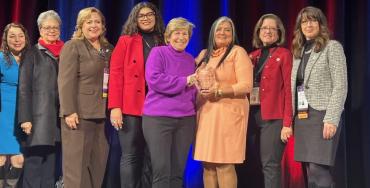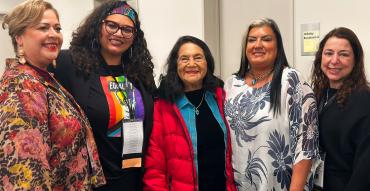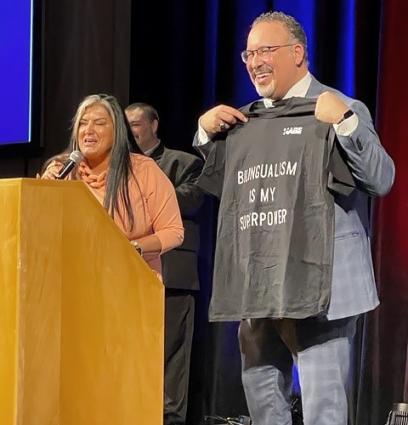Undeterred by an unexpected snowstorm, AFT members and leaders gathered at the resoundingly successful National Association for Bilingual Education conference in Portland, Oregon, Feb. 23-25, sharing information and inspiration about educating the over 5 million English learners in the United States, and helping these students—native born, newcomers, refugees and immigrant youth—elevate their skills. It was the first NABE conference with AFT Executive Vice President Evelyn DeJesus as NABE president, and she proudly amplified the event’s theme, United in Our Diversity: The Power of Languages and Cultures.
DeJesus took on the leadership role because, she said, she recognized that schools are in crisis, with insufficient resources and growing populations of English learners. But it is a crisis that comes with opportunity, said DeJesus. “Parents and caregivers trust you with the future of their kids,” she told the thousands of educators gathered for the conference. “And that, my friends, is NABE’s opportunity.”
DeJesus pointed out that while the last administration “tried to bury” the Office of English Language Acquisition in the U.S. Department of Education, today OELA is headed by a former English language learner and friend to the labor movement, Montserrat Garibay, and the department itself is headed by former English learner Secretary Miguel Cardona.
And NABE offers practical resources for members, from a professional journal to more than 20 special interest groups, revamped professional development and digital badges earned for learning things like biliteracy pedagogy and practicing equity. There’s also the AFT’s bilingual website for educators and families, Colorín Colorado; Share My Lesson, with resources for and by educators; and Reading Opens the World, the distribution campaign that has shared more than 1 million books, including multiethnic and bilingual titles, with children across the country.
“We are strong, we are united in our diversity, and we are ready to take up this challenge,” said DeJesus.
With some 4,000 participants, the conference hosted inspiring keynote speakers like labor icon Dolores Huerta, Education Secretary Cardona, AFT President Randi Weingarten and Garibay from OELA. Ultimately, everyone focused on the educators and students themselves. “Students reach their potential because of you,” Weingarten told participants. Citing slim resources and attacks on educators trying to teach in a culturally responsive, inclusive way—in the face of things like book bans—she said that, “even with all of this, public schools are where dreams are kindled and realized. NABE members are there to help students dream, grow and thrive.”
At an awards ceremony recognizing outstanding achievements among teachers and students, student stories brought to life the moving language journeys so many people make in our public schools. JinHui Li, a high school student from Baldwin Park, Calif., described how his “weird Chinese-style English made some people laugh at me” when he first moved to the United States, and how he was embarrassed by and impatient with his mother, who needed him to translate for her. But he eventually appreciated the risk she took moving to a foreign country to give him a better education—and trying to become bilingual. “Now, I realize that everything she does is for my future,” he said. “Most important, I understand that I am my mother’s dream, and I feel so proud and honored to carry that dream with me as I face the future.”
Dozens of workshops and panel discussions pointed the way for educators to support students like JinHui Li and so many others, providing everything from overviews of the field to practical skill-building; many were led by AFT members, including members of the AFT’s Asian American and Pacific Islander Task Force and ELL Cadre, who also met in Portland to discuss language access and support for ELLs and families. Task force chairs Jessica Tang and Tracy Lai led discussions on mental health and wellness and innovative programs in higher education to support English learners.
Other AFT-led workshops included one on the importance of mental health and social-emotional well-being and another on schools’ civil rights obligations to students. One discussed creative solutions to the “mass exodus” of teachers, including ELL teachers, from schools since the pandemic began. Another discussed how to maintain cultural competency so that teachers can reach students with authentic reflections of their home languages and cultures; one workshop focused on research-based strategies for teaching math to English learners.
There were also sessions on federal policy recommendations, getting a school ready to welcome newcomers, how to use science to approach learning equitably and how to honor the importance of given names.
The conference went deep into detail, but also established an overarching idea that drove the work: that, as Education Secretary Cardona proclaimed, “Bilingualism and biculturalism is a superpower.”
“In 2023, in many school systems in our country, we treat our English learners as students with deficits rather than assets in a globally competitive world,” said Cardona, whose parents are from Puerto Rico. “It defies what other multilingual countries already understand. It defies our historical reality as a nation born of immigrants. … Let’s put to bed once and for all the notion that multilingualism is just a bonus or, worse, a deficit. We need to build a new era of multilingualism in America.”
[Virginia Myers]



